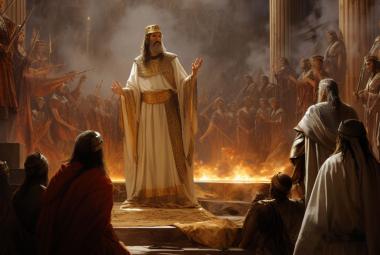Most of what we associate with the “Magi” is from early church traditions. What do we really know about the Magi?
Each year as we approach the holiday season, our preparations for Christmas include revisiting the events surrounding the birth of Our Lord. Bethlehem,[1] the shepherds, and the angels are all familiar to us. But not much is generally known about the mysterious “Magi” who came to worship the infant Jesus. The following background may be helpful to stimulate conversations around the fireplace, as our thoughts turn to this incredible event from which we measure our very calendar.
Traditions
Most of what we associate with the “Magi” is from early church traditions. Most have assumed that there were three of them since they brought three specific gifts. (But the Biblical text doesn’t number them.) They are called “Magi,” from the Latinized form of the Greek word magoi, transliterated from the Persian for a select sect of priests. (Our word “magic” comes from the same root.)
As the years passed, traditions became increasingly embellished. By the 3rd century, they were viewed as kings. By the 6th century they had names: Bithisarea, Melichior, and Gathaspa. Some even associated them with Shem, Ham and Japheth, the three sons of Noah, and thus with Asia, Africa, and Europe. A 14th-century Armenian tradition identifies them as Balthasar, King of Arabia; Melchior, King of Persia; and Gasper, King of India. These are all very interesting traditions, but what do we really know about the Magi?
The Priesthood of the Medes
The ancient Magi were a hereditary priesthood of the Medes credited with profound and extraordinary religious knowledge. After some Magi, who had been attached to the Median court, proved to be expert in the interpretation of dreams, Darius the Great established them over the state religion of Persia.[2] It was in this dual capacity whereby civil and political counsel was invested with religious authority, that the Magi became the supreme priestly caste of the Persian Empire, and continued to be prominent during the subsequent Seleucid, Parthian, and Sasanian periods.[3]
The Role of Daniel
One of the titles given to Daniel was Rab-mag, the Chief of the Magi.[4] His unusual career included being a principal administrator in two world empires: the Babylonian and the subsequent Persian Empire. When Darius appointed him, a Jew, over the previously hereditary Median priesthood, the resulting repercussions resulted in the plots leading to the lion’s den.[5] Daniel apparently entrusted a Messianic vision (to be announced in due time by a “star”) to a secret sect of the Magi for its eventual fulfillment.
Since the days of Daniel, the fortunes of both the Persian and the Jewish nations had been closely intertwined. Both nations had, in their turn, fallen under Seleucid domination in the wake of Alexander’s conquests. Subsequently both had regained their independence: the Jews under Maccabean leadership, and the Persians as the dominating ruling group within the Parthian Empire.
Rome on the Rise
Pompey, the first Roman conqueror of Jerusalem, attacked the Armenian outpost of Parthia in 63 B.C. In 55 B.C. Carssus led Roman legions in sacking Jerusalem and, in a subsequent attack, Parthia proper. The Romans were decisively defeated at the battle of Carrhae and the Parthians counterattacked with a token invasion of Armenia, Syria, and Israel. Nominal Roman rule was reestablished under Antipater, the father of Herod, who retreated before another Parthian invasion in 40 B.C.
Mark Anthony reestablished Roman sovereignty in 37 B.C., but also embarked on an ill-fated Parthian expedition. His disastrous retreat was followed by another wave of invading Parthians, which swept out all Roman opposition (including Herod himself, who fled to Alexandria and then to Rome). With Parthian collaboration, Jewish sovereignty was restored and Jerusalem was fortified with a Jewish garrison. Herod, by this time, secured from Augustus Caesar the title of “King of the Jews.” However, it was not for three years (including a five month’s siege by Roman troops) that he was able to occupy his own capital city. Herod had thus gained the throne of a rebellious buffer state, which was situated between two mighty contending empires. At any time, his own subjects might conspire in bringing the Parthians to their aid.
The Entourage to Jerusalem
In Jerusalem, the sudden appearance of the Magi, probably traveling in force with every imaginable oriental pomp and accompanied by adequate cavalry escort to insure their safe penetration of Roman territory, certainly alarmed Herod and the populace of Jerusalem. Their request of Herod regarding the one “who has been born King of the Jews”[6] was a calculated insult to him, a non-Jew[7] who had contrived and bribed his way into that office. Consulting his scribes, Herod discovered from the prophecies in the Tanach (the Old Testament) that the Promised One, the Messiah, would be born in Bethlehem.[8] Hiding his concern and expressing sincere interest, Herod requested them to keep him informed. After finding the babe and presenting their prophetic gifts, the Magi “being warned in a dream” (a form of communication most acceptable to them) departed to their own country, ignoring Herod’s request.
The Christmas Gifts
The gifts of gold, frankincense, and myrrh were also prophetic, speaking of our Lord’s offices of king, priest, and savior. Gold speaks of His kingship; frankincense was a spice used in the priestly duties; and myrrh was an embalming ointment signifying His death. In the millennium, He will also receive the gifts of gold and frankincense;[9] but no myrrh. His death was once and for all. What gifts are YOU going to give Him this year? Discuss it with Him.
Notes:
- For background on why it was Bethlehem, study the Book of Ruth, or our briefing package, The Romance of Redemption. ↩
- Oneiromancy, not astrology, is the key skill mentioned by Herodotus, I.107, 120; VII.19. ↩
- Zondervan Pictorial Encyclopedia of the Bible, 4:31–34. ↩
- Daniel 4:9; 5:11. ↩
- Daniel 6. ↩
- Matthew 2:2. ↩
- Herod was Idumean (an Edomite), a traditional enemy of Israel. ↩
- Micah 5:2. (Revealed by Holy Scripture, not astrology.) ↩
- Isaiah 60:6. ↩







